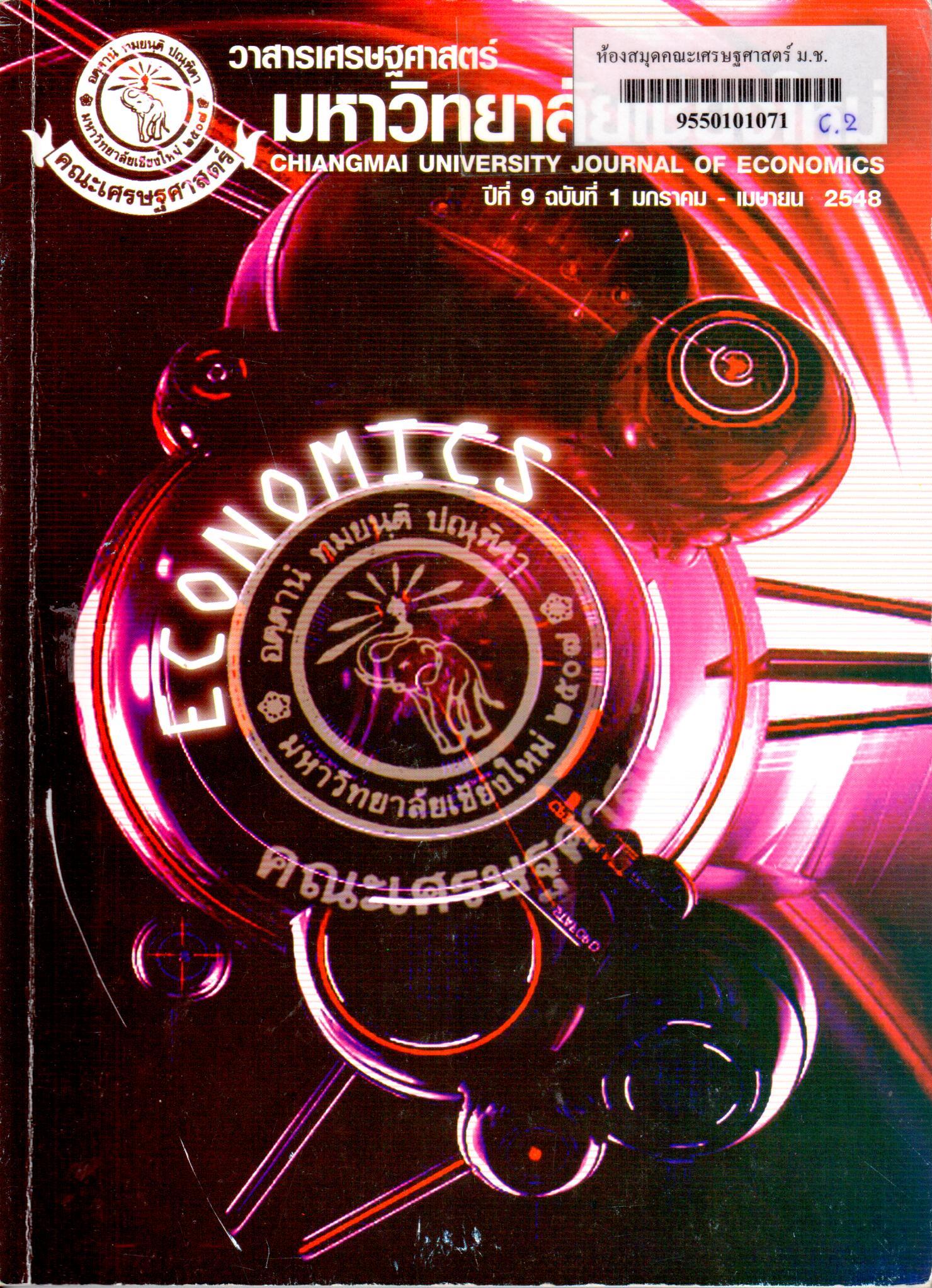การวิเคราะห์อุปสงค์นำเข้าแอปเปิลจากจีน ภายใต้ความตกลงการค้าเสรีไทย – จีน
Abstract
บทคัดย่อ
การวิเคราะห์อุปสงค์นำเข้าแอปเปิลจากจีนภายใต้ความตกลงการค้าเสรีไทย - จีน เพื่อความสัมพันธ์เชิงดุลยภาพระยะสั้นและระยะยาวของปัจจัยราคาและรายได้ ขอสมการอุปสงค์นำเข้าแอปเปิลจากจีน โดยใช้เทคนิค cointegration และ และ error correction ตามวิธี two-step approach ของ Engle-Granger แล้วประมาณสมการอุปสงค์นำเข้าโดยแบบจำลอง Error Correction Mechanism (ECM) ตลอดจนศึกษาแนวโน้มและการเปลี่ยนแปลงปริมาณนำเข้าแอปเปิลจากจีนภายหลังการค้าเสรีไทย - จีน โดยเปรียบเทียบปริมาณทำคลอดแอปเปิลจากจีนกับ ข้อมูลปริมาณนำเข้าแอปเปิลจากจีนที่ปรับด้วยดัชนีฤดูกาล วิเคราะห์ข้อมูลด้วยสมการแนวโน้มทดถอยเชิงเส้น และสมการ piecewise regression รวมถึงศึกษาลักษณะของผลกระทบทางเศรษฐกิจของการค้าแอปเปิล และผลกระทบที่เกิดขึ้นจากการนำเข้าผักและผลไม้ปราจีนต่อผู้ผลิตและผู้บริโภคภายในประเทศ
จากการทดสอบความนิ่งของข้อมูลในการวิเคราะห์อุปสงค์นำเข้าแอปเปิลจากจีน ด้วยวิธี Augmented Dickey-Fuller (ADF) teat พบว่า ตัวแปรปริมาณนำเข้า(lnQmt ) ราคาเปรียบเทียบ [ln(Pmt/CPIt)] และรายได้เปรียบเทียบ [ln(Ydt/CPIt)] มีความนิ่งที่ระดับ l(1) ซึ่งตัวแปรทั้งสามมีความสัมพันธ์เชิงดุลยภาพระยะยาว โดยราคาเปรียบเทียบและรายได้เปรียบเทียบ สามารถอธิบายปริมาณนำเข้าแอปเปิลจากจีน ได้ร้อยละ 81 ณ ระดับนัยสำคัญทางสถิติ 0.01 นอกจากนี้ ตัวแปรรายได้เปรียบเทียบมีความยืดหยุ่นมากกว่าความยืดหยุ่นของราคาเปรียบเทียบ แสดงให้เห็นว่า การดำเนินนโยบายรายได้จะมีผลต่อการเปลี่ยนแปลงปริมาณนำเข้าแอปเปิลจากจีนมากกว่านโยบายราคา และจากการศึกษาแนวโน้มปริมาณนำเข้าแอปเปิลจากจีนพบแนวโน้มและการเปลี่ยนแปลงปริมาณการนำเข้าแอปเปิลเพิ่มขึ้นอย่างชัดเจน ภายหลังการค้าเสรีไทย-จีน ซึ่งเป็นผลกระทบทางเศรษฐกิจในลักษณะของการเพิ่มปริมาณการค้าระหว่างไทยและจีน
อย่างไรก็ตาม เกษตรกรผู้ปลูกกระเทียมเป็นผู้ได้รับผลกระทบจากการค้าเสรีไทย-จีน เนื่องจากราคานำเข้ากระเทียมของจีนต่ำกว่าต้นทุนการปลูกกระเทียมของไทย ส่วนผู้บริโภคได้รับประโยชน์จากการค้าเสรี โดยเฉพาะการนำเข้าแอปเปิลจากจีนมากที่สุด ซึ่งมีสัดส่วนการนำเข้าแอปเปิลจากจีนสูงถึงร้อยละ 92.35 ภายหลังการค้าเสรีไทย-จีน ทั้งนี้ รัฐบาลควรให้ความสำคัญต่อการนำเข้าผักและผลไม้จากจีน โดยเน้นด้านมาตรการสุขอนามัย และตรวจสอบสารพิษตกค้างอย่างเข้มงวด ย่อมเป็นมาตรการการนำเข้าที่ช่วยลดผลกระทบต่อผู้ผลิต และเพื่อคุ้มครองผู้บริโภคภายในประเทศ อีกทั้งยังเป็นการสนับสนุนนโยบายของรัฐที่รณรงค์ให้คนไทยบริโภคอาหารปลอดภัยและมีสุขอนามัยที่ดี ภายใต้โครงการเมืองไทยแข็งแรง (Healthy Thailand) ภายในปี พ. ศ. 2560 นอกจากนี้ภาครัฐและภาคเอกชน มีความจำเป็นที่ต้องประสานความร่วมมือกันในการปรับตัวและเตรียมความพร้อมกับสถานการณ์การค้าเสรีอย่างเป็นเอกภาพ เพื่อให้การค้าเสรีก่อให้เกิดประโยชน์สูงสุดต่อสังคมและประเทศสืบต่อไป
Abstract
This study has three main objectives which are: Firstly, to study relationship between price, income and import demand for apple from China in the short-run and long-run equilibrium. For that purpose, data from the first quarter of 1998 to the third quarter of 2004 are analyzed with Cointegration and error correlation using two-steps approach method of Engle-Granger. Thereafter, import demand function is developed applying Error Correction Mechanism model. Secondly, to study trend and conversion trend of import apple from China after Thai-Chinese Free Trade Agreement (FTA) has been settled. Data employed for this objective are collected from monthly import quantity of apples is then compared with seasonal adjusted import quantity using time trend regression and piecewise regression. The third objective is to study impact of importing vegetables and fruits from China on domestic production, producer and consumer.
Time series data must be tested for unit root by Augmented Dickey-Fuller (ADF) test. The results show that variable; import quantity (InQmt), relative price [In(Pmt/CPIt)], and relative income [In(Ydt/CPIt)] are stationary at the first difference with the significance at 1 % level. Also, the results show that import quantity, relative price, and relative income have correlation in the long-run equilibrium. The Import demand function for Chinese apples can be explained by relative price and relative income by 81% with the significant at 1% level. However, relative income has higher elasticity than relative price. It means that domestic income change will have bigger effect on demand of apple than import price itself. As a result, this implies that income policy impacts on import quantity more than price policy. In addition, trend and conversion trend are found to be increased after Thai-Chinese FTA.
Free trade of vegetables and fruits between Thailand and China creates the economic effect to trade creation. Farmer who grows garlic suffer from Thai-Chinese FTA because import price of garlic from China is lower than cost of Thai garlic. Consumer gains benefit from FTA because prices of fruits and vegetables from China are so cheap, especially the higher import rate of apples from China equal 92.35% after Thai-Chinese FTA. Nevertheless, government must be watchful in importing those vegetables and fruits regarding public hygiene. The policy will greatly contribute to the objectives of government project on Healthy Thailand Project within 2017. Moreover, policy-makers and other private sectors should cooperate closely regarding preparation for FTA in order to maximize benefit from market economy in the future.
Downloads
Issue
Section
License
All opinions and contents in the CMJE are the responsibility of the author(s). Chiang Mai University Journal of Economics reserves the copyright for all published materials. Papers may not be reproduced in any form without the written permission from Chiang Mai University Journal of Economics.






